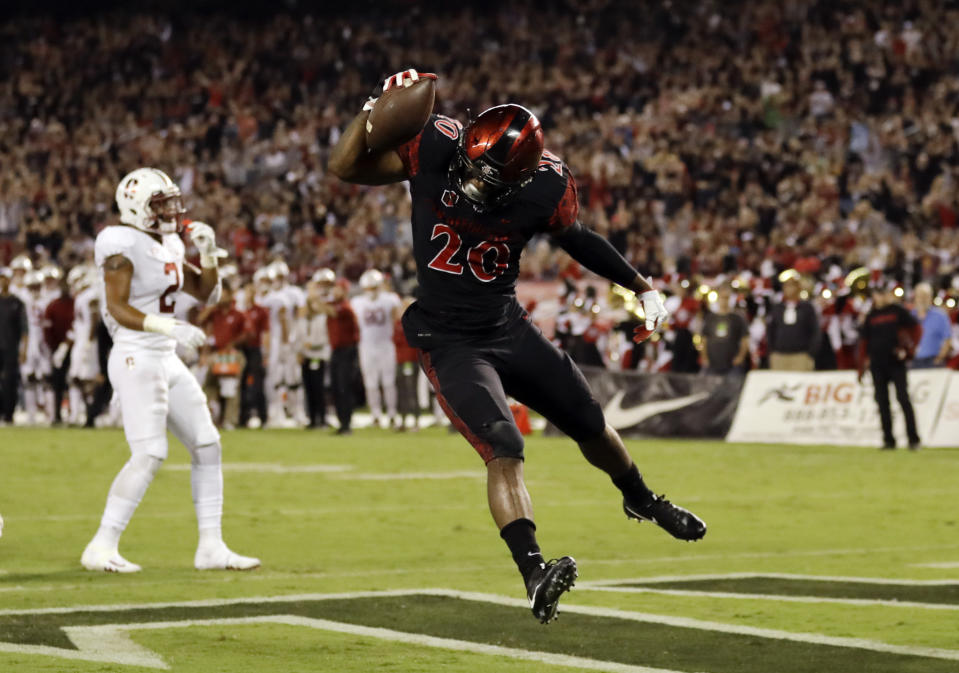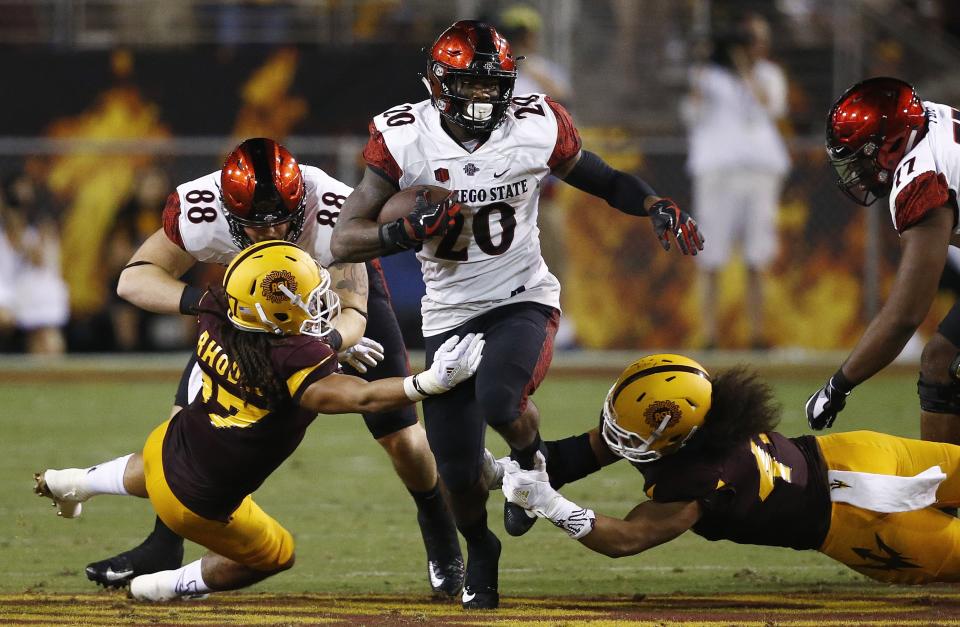How San Diego State's Rashaad Penny blossomed into the nation's leading rusher

Watch Rashaad Penny power through an arm tackle or stiff arm a defender to the turf this season, and you’d never guess what the San Diego State star’s biggest problem once was.
Believe it or not, he used to be afraid of getting hit.
When Penny played backyard football with his older brothers and their friends, he was typically among the smallest kids in those games. He’d compensate for his lack of size and strength by watching YouTube videos of Reggie Bush and emulating the ex-USC star’s famous cross-field runs, jukes and jump cuts.
Dynamic speed and rare elusiveness helped Penny make an instant impact during his first two seasons of organized football in high school, but at barely 160 pounds, he was uncomfortable fighting through contact for hard yards or running between the tackles. He preferred to bounce runs outside, where he could make defenders miss in open space or get safely out of bounds without sustaining punishment.
“When he’d get the ball, he wasn’t trying to get touched,” oldest brother Robert Penny said. “He’d run east-west across the field instead of north-south. It was hard for him running up the middle at first because he wasn’t used to reading holes, so I took some time out to teach him. I told him, ‘Once you get a little bit bigger and actually learn how to play the position, no one will be able to stop you.’ ”
That prediction appears prescient now that Penny is striking fear into opposing defenses instead of the other way around. The same kid who once shuddered at the thought of enduring hits in high school is now college football’s leading rusher, a long-shot Heisman candidate and a legitimate NFL prospect.
In his first season no longer playing second fiddle to Division I’s all-time leading rusher Donnel Pumphrey, Penny has piled up a national-best 588 rushing yards and four touchdowns while leading unbeaten San Diego State (3-0) to victories over Pac-12 foes Stanford and Arizona State. The multifaceted senior has also caught nine passes out of the backfield and taken a kickoff back 99 yards for a touchdown.
Whereas the 5-foot-8, 176-pound Pumphrey atoned for limited size and strength with razor-sharp cuts and remarkable quickness, the 5-foot-11, 220-pound Penny is a prototypical downhill slasher. He patiently waits for a hole to emerge, accelerates through the smallest crevice and unleashes his full array of speed and power in the open field, lowering his shoulder through some would-be tacklers and leaving others grasping at air.
“He’s explosive, he runs through tackles and he’s such a strong runner,” San Diego State offensive coordinator Jeff Horton said. “People underestimate how fast he is. He’s not as sudden or quick as Pumphrey was, but you don’t run back six kickoffs for touchdowns without being able to really go. He’s by you so fast that you can’t bring him down.”
Penny’s emergence has been perfectly timed for a San Diego State program trying to make a leap in relevance not only nationally but also in its own market. Days after the Chargers departed for Los Angeles last January, San Diego State unveiled a new “One City. One Team.” slogan in an effort to take advantage of the hole in the hearts of football fans throughout the region.
Mountain West football is no substitute for the NFL, but the Aztecs are doing their best to fill the void. Season ticket sales are up 26 percent this season for a program that has been to seven straight bowl games, captured two straight Mountain West titles and won more than two-thirds of its games under head coach Rocky Long.
“When the Chargers left, we sensed that this could be our time,” Penny said. “We want to come together as a team for this city. I’ve been in San Diego for four years and the entire time San Diego has been starved for a winning team. I feel like we have that winning culture here. We can do some things that have never been done at San Diego State this season, but we have to take it week by week.”
While Penny’s athletic success comes as no surprise to his family and friends, there was a time they probably thought he’d excel more on the diamond instead of the gridiron. Like his two older brothers, Penny focused primarily on baseball as a kid growing up in the Los Angeles suburb of Norwalk before picking up football in high school.
Oldest brother Robert showcased impressive balance and vision while shining at running back for Norwalk High School and Orange Coast College. Second brother Elijhaa is a bulldozing power running back now in his second season as a backup for the Arizona Cardinals And then there’s Rashaad, by far the most explosive athlete of the trio.
Even though Rashaad had to learn to attack holes and finish runs early in his high school career, the versatile running back’s talent was unmistakable. He scored 103 touchdowns in three varsity seasons at Norwalk High, 80 on the ground and the rest as a receiver out of the backfield or as a dynamic kick returner. He also excelled as a ball-hawking cornerback on defense and averaged more than 40 yards per kick as Norwalk’s primary punter.
Penny’s all-around brilliance earned him scholarship offers from virtually every Mountain West program, but schools in the Pac-12 were slower to come around. Coaches from UCLA, USC, Cal, Washington and Utah all scouted him but either did not pursue him as a running back or did not want him at all.
“I don’t know what was holding them back,” former Norwalk High coach Jesse Ceniceros said. “He had some interest from some Pac-12 schools, but not as many as I thought should be showing interest. You had a kid that could take over a game any moment that he stepped onto the field. I was surprised that the Pac-12 schools didn’t come after him.”
Maybe Pac-12 coaches were concerned that Penny’s slender frame wouldn’t withstand the pounding of college football. Or perhaps they feared he couldn’t make a smooth transition from Norwalk’s run-oriented double wing offense to a more traditional system. Whatever the reason, San Diego State offensive coordinator Jeff Horton is grateful a more prestigious program didn’t swipe Penny away from the Aztecs after they offered him a scholarship as a sophomore.
“I’m not big on offering that young, but to me he was a guy who was a no brainer,” Horton said. “I felt we were very fortunate that a so-called bigger school didn’t come by. I knew he wasn’t going to go too far from home since he’s such a big family guy, but when UCLA and USC didn’t offer him, I thought we had a really good chance to get him.”

When Penny arrived at San Diego State as a freshman in fall 2014, everything was a struggle for him at first. Classes and early-morning workouts were tough. Pass blocking and route running were largely brand new to him. So was beginning a season buried on the depth chart behind more experienced running backs.
But more than anything what bothered Penny was being away from his close-knit family for the first time in his life.
“When he first got here, he’d get out of a meeting and call mom before he was two steps out the door,” Horton said. “He was really homesick. That’s really why I felt we should keep him with us as a freshman and not redshirt him. I felt like if we sent him to the other end, he might disappear one day.”
In truth, Penny wanted to leave early in his freshman year. He’d call his mother or his siblings and beg for permission to come home. Only after they repeatedly told him to stick it out and not throw away his chance at a free college education did he decide to persevere.
Opportunities to run the ball were scarce for Penny as a freshman, but he found a niche as a kick return specialist. He also added muscle in the weight room, worked to become a more reliable receiver and pass blocker and grew more comfortable lining up deep in the backfield and reading blocks rather than just relying on his athletic ability.
Whereas some players might have seen playing behind Pumphrey as reason to sulk or consider a transfer, Penny viewed it as an opportunity to learn. Their mentor-understudy relationship evolved into a close friendship built on competing against each-other in everything from foot races after practice to games of Madden in their dorm.
“I learned so much from him,” Penny said. “He was a really hard runner for his size and he played with an edge every game. Even in pass protection against guys like 6-3 or 6-4, he’d be almost pancaking these dudes. He played with a chip on his shoulder because he had to prove something to a lot of people. That’s definitely something I feel as well.”
Penny has reason to feel like he has something to prove in spite of his brilliant start to the season. He ran for 1,005 yards on 7.4 yards per carry last season as Pumphrey’s understudy, yet he wasn’t among the 61 names on the Doak Walker Award’s preseason watch list, nor was he mentioned on most other preseason lists highlighting the nation’s best running backs.
In three games, Penny has made that seem like an egregious mistake.
The kid who didn’t play organized football until high school gashed UC Davis for 197 yards and two touchdowns in San Diego State’s season opener. The kid who didn’t receive a Pac-12 scholarship offer torched Arizona State for 353 all-purpose yards and two more touchdowns the following week. And the kid who used to shy away from contact ran the ball 32 times for 175 yards last Saturday against a Stanford defense known for its toughness and physicality.
“Me and my brother Elijhaa were texting during the Stanford game,” Robert Penny said. “We were like, ‘This is crazy. This guy is not human.’ It’s pretty amazing how far he has come.”
– – – – – – –
Jeff Eisenberg is the editor of The Dagger on Yahoo Sports. Have a tip? Email him at daggerblog@yahoo.com or follow him on Twitter!

